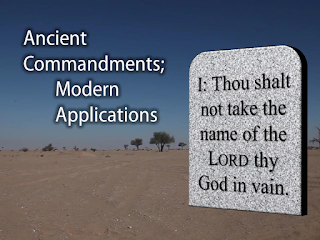How do we apply, "Thou shalt not take the name of the Lord they God in vain," today?

Hespeler, 26 June, 2016 © Scott McAndless Exodus 20:1-7, Matthew 5:17-20, 33-37, Psalm 119:1-8 S omewhere around 3500 years ago (as the story is told) there was a group of tribes wandering together through the desert when they encountered their God in a pretty remarkable way. And the God that they met in that desert apparently had some clear ideas about how ancient tribal people like them needed to live their lives and what they had to do. And so God gave them commandments – rules that they were supposed to live by. Even more important, he promised them that if they lived according to these rules they would be blessed and live good lives in a land to which he would lead them. And they were good commandments and wise commandments. But they were also tailor-made for tribal people living somewhere about 3500 years ago. What I mean is that, for them, the application of the commandments was usually pretty straightforward. The situations that they came across in




